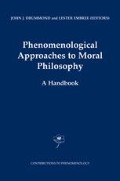Abstract
The seeds of Edith Stein’s ethical theory are present in her earliest work, Zum Problem der Einfühlung (1917; On the Problem of Empathy, 1964), since there she discovers that only empathy can disclose others. In her analysis of experiences of empathy, Stein enriched the phenomenological notion of the “person in the world.” As early as age twenty-two—when she arrived at the University of Göttingen to study under Husserl—until her death at Auschwitz in 1942, her principal philosophical interest and the driving force behind her philosophy remained the person. For Stein, persons are the highest value. She also held that one “ought” to realize the values that (s)he can achieve. Thus all ethical dicta share a single intention: realizing the intrinsic value of persons, oneself and others.
Access this chapter
Tax calculation will be finalised at checkout
Purchases are for personal use only
Preview
Unable to display preview. Download preview PDF.
References
Edith Stein, Essays On Woman, trans. Freda Mary Oben (Washington, DC: ICS Publishing, 1996), 192 (hereafter EW).
Edith Stein, Endliches und ewiges Sein. Versuch eines Aufstiegs zum Sinn des Seins (Louvain: Nauwelaerts, 1950), 414 (hereafter EES).
Edith Stein, On the Problem of Empathy, trans Waltraut Stein (The Hague: Martinus Nijhoff, 1964), 98 (hereafter OE).
Marianne Sawicki, Body, Text, and Science (Dordrecht: Kluwer Academic Publishers, 1997), 1.
“Beiträge zur philosophischen Begründung der Psychologie und der Geisteswissenschaften,” Zweite Abhandlung, Jahrbuch für Philosophie und phänomenologische Forschung 5 (1922): 116–283; rpt. Tübingen: Max Niemeyer, 1970.
Mary Catherine Baseheart aptly sums up Stein’s analysis of the natural eidos of community. “The genuine being of community has its origin in the personal individuality of the individuals, not vice versa, though there is mutual influence. To use Stein’s metaphor, the life-streams of the persons flow together and unite without the separation of the subjects being annulled. Each one experiences the enlarging of his/her life in new experiences, thought-activities, values, and will dispositions, and simultaneously an enlarging of the sphere in which the impulses become operative”—Baseheart, Person and World: Introduction to the Philosophy of Edith Stein (Dordrecht: Kluwer Academic Publishers, 1997), 64.
Etienne Gilson, Being and Some Philosophers (Toronto: Pontifical Institute of Medieval Studies, 1952), 204: “the very notion of a purely essential cognition of being is self-contradictory....”
Edith Stein, Life in a Jewish Family, trans. Josephine Koeppel (Washington, DC: ICS Publications, 1986), 7.
Author information
Authors and Affiliations
Rights and permissions
Copyright information
© 2002 Springer Science+Business Media New York
About this chapter
Cite this chapter
Haney, K.M., Valiquette, J. (2002). Edith Stein: Woman as Ethical Type. In: Phenomenological Approaches to Moral Philosophy. Contributions to Phenomenology, vol 47. Springer, Dordrecht. https://doi.org/10.1007/978-94-015-9924-5_23
Download citation
DOI: https://doi.org/10.1007/978-94-015-9924-5_23
Publisher Name: Springer, Dordrecht
Print ISBN: 978-90-481-6082-2
Online ISBN: 978-94-015-9924-5
eBook Packages: Springer Book Archive

